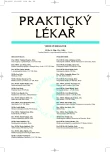-
Medical journals
- Career
Epileptic fit as a syncope equivalent in severe aortic stenosis.
Authors: A. Krüger; P. Niederle
Authors‘ workplace: Nemocnice Na Homolce, Praha ; Přednosta: prof. MUDr. Petr Niederle, DrSc. ; Kardiologické oddělení
Published in: Prakt. Lék. 2007; 87(4): 241-242
Category: Case Report
Overview
The case report of a patient suffering from dyspnea and chest pain together with a history of repetitive epileptic paroxysms within the past few months is presented. The epileptic fits were also registered during his hospital stay. Transthoracic echocardiography proved moderate left ventricular dysfunction (ejection fraction 33 %) and severe aortic valve stenosis (peak pressure gradient 102 mmHg, aortic valve area 0.45 cm2). The epileptic fits were also documented by electroencephalography (EEG) and a transcranial Doppler study detected reduced blood flow within the intracerebral arteries. The patient underwent successful cardiosurgery to replace the stenotic aortic valve with a mechanical prothesis (SJM Regent 25 mm). Myocardial function showed marked improvement (EF 50 %) following the procedure. Repeated EEG examination exhibited completely normal findings. At present, the patient remains in good health without any epileptic fits. We consider the case of aortic stenosis inducing epileptic symptoms caused by transient cerebral ischemiaextremely rare and informative for general practitioners and other physicians.
Key words:
severe aortic stenosis, secondary epilepsy.
Labels
General practitioner for children and adolescents General practitioner for adults
Article was published inGeneral Practitioner

2007 Issue 4-
All articles in this issue
- Todays trends of diagnostics and treatment of scaphoid bone fractures
- An update on the Global strategy for asthma management and prevention – as viewed from the current situation in the Czech Republic
- Osteoarthritis – some new aspects of this disease
- Renal failure and renal replacement therapy in children
- Smoking and skin
- Is atap water suitable for the preparation of infant formula?
- Neurological complications of Q fever
- Perspectives of non-pharmacological treatment of atrial fibrillation – the MAZE procedure
- The importance of serum iron levels in patients with chronic hepatitis B and C.
- Extensive trombosis of thoracic aorta – an unusual source of acute peripheral arterial embolism.
- Epileptic fit as a syncope equivalent in severe aortic stenosis.
- Complications of atrial fibrillation in chlamydial myocarditis
- Capsule endoscopy and its current place in diagnostics of the gastrointestinal tract.
- Viral infections in patients after transplantation and with an immune response disorder
- Health Liability – an unusual case
- General Practitioner
- Journal archive
- Current issue
- Online only
- About the journal
Most read in this issue- Todays trends of diagnostics and treatment of scaphoid bone fractures
- Extensive trombosis of thoracic aorta – an unusual source of acute peripheral arterial embolism.
- Epileptic fit as a syncope equivalent in severe aortic stenosis.
- Smoking and skin
Login#ADS_BOTTOM_SCRIPTS#Forgotten passwordEnter the email address that you registered with. We will send you instructions on how to set a new password.
- Career

